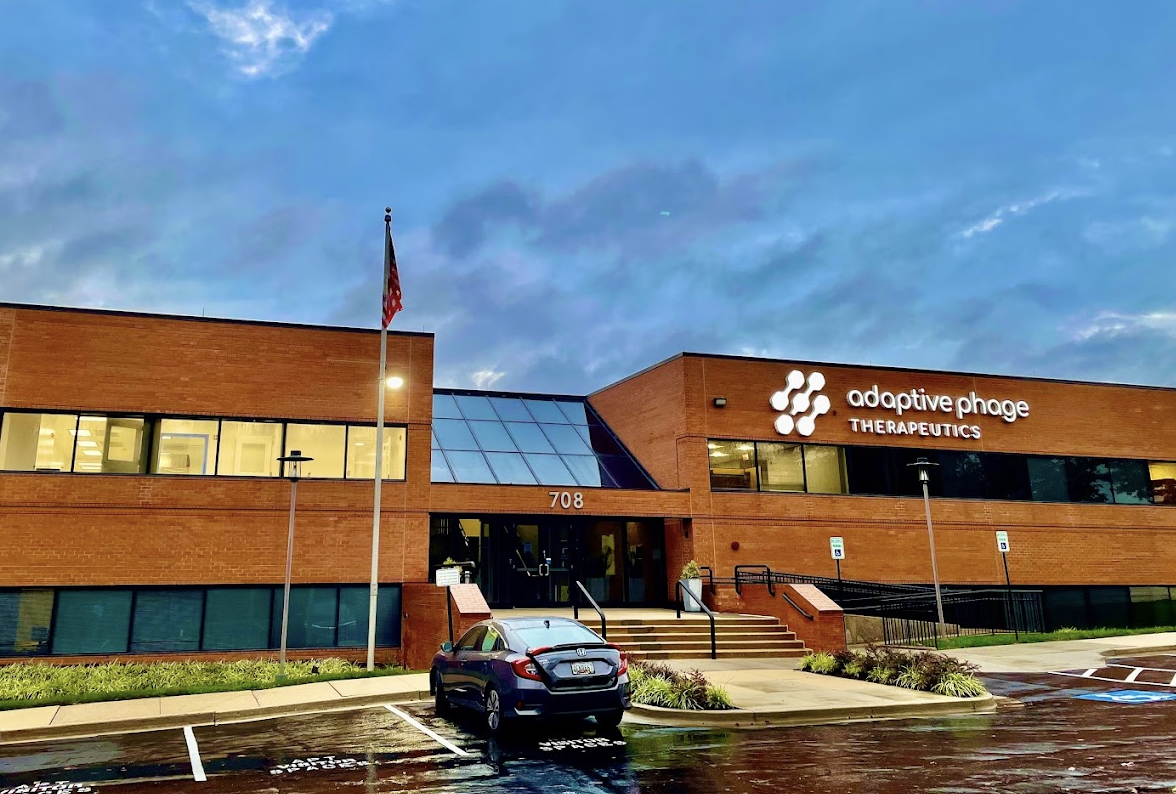
Gaithersburg-based Adaptive Phage Therapeutics, Inc., (APT) a clinical-stage biotechnology company (located at 708 Quince Orchard Rd) advancing the APT phage bank, the world’s largest therapeutic phage initiative for treatment of bacterial infectious diseases, announced the first patient has been dosed in the PHAGE clinical trial, evaluating bacteriophage therapy in adults with cystic fibrosis (CF) who carry Pseudomonas aeruginosa (P. aeruginosa) in their lungs. The trial is evaluating whether the bacteriophage, or “phage,” therapy is safe and able to reduce the amount of bacteria in the lungs of volunteers. The trial is being conducted by the Antibacterial Resistance Leadership Group (ARLG) which consists of more than 100 leading experts, working together to combat the ongoing antibacterial resistance crisis and improve patient care. ARLG is funded by the National Institute of Allergy and Infectious Diseases (NIAID) at the National Institutes of Health (NIH). The investigational phage therapeutic, WRAIR-PAM-CF1, was developed by the Walter Reed Army Institute of Research (WRAIR) and is licensed to and manufactured by APT. The trial is expected to enroll a total of 72 patients at multiple sites across the country.
Per the press release: “At Adaptive Phage Therapeutics, we are committed to developing innovative treatments that address the growing problem of antibiotic resistance,” said Greg Merril, CEO of Adaptive Phage Therapeutics. “We are proud to be a part of this important trial and look forward to working with the ARLG, NIAID, WRAIR, and the CF community to bring new hope to those affected by this devastating disease and secondary respiratory infection.”
Phages are viruses that can kill or neutralize specific bacteria while leaving non-target bacteria and human cells unharmed. For more than a century, researchers have considered the potential use of phages as therapeutics, theorizing that mixtures of bacteriophages might be used on their own, or in conjunction with antibiotics, to treat bacterial infections—especially those resistant to antibiotics.
P. aeruginosa, a serious and sometimes deadly bacterium frequently acquired in healthcare settings, is the most common bacterial cause of CF exacerbations. P. aeruginosa can take advantage of the tissue damage caused by CF changes in mucus to infect and colonize the lungs. Multidrug-resistant P. aeruginosa infections are becoming increasingly common, and in recent years, only a handful of new antibiotics have been approved to treat them.
The PHAGE trial is enrolling CF patients who chronically harbor P. aeruginosa in their respiratory tracts. Participants receive WRAIR-PAM-CF1 as a single IV infusion at one of three dosage levels. Researchers will gather data on safety and microbiological activity; how the phages function in the body; how the investigational therapy affects the participants’ lung function; whether the therapy works differently on P. aeruginosa from different geographical regions; and whether the therapy changes participants’ overall quality of life.
About the Walter Reed Army Institute of Research (WRAIR)
WRAIR, part of the U.S. Army Medical Research and Development Command under the Army Futures Command, provides unique research capabilities and innovative medical solutions to a range of Force Health Protection and Readiness challenges currently facing U.S. Service Members, along with threats anticipated during future operations. For more information about the Walter Reed Army Institute of Research, visit https://wrair.health.mil/.
About The Antibacterial Resistance Leadership Group (ARLG)
The ARLG is a clinical research consortium supported by NIAID which works to combat the antibacterial resistance crisis and improve patient care. ARLG’s mission is to prioritize, design, and execute clinical research that will impact the prevention, diagnosis, and treatment of infections caused by antibiotic-resistant bacteria. It is facilitated by the Duke Clinical Research Institute and works under the leadership of an executive committee, four component centers, and two Principal Investigators: Vance Fowler, MD, of Duke University, and Henry “Chip” Chambers, MD, of University of California, San Francisco. For more information about this trial, visit ClinicalTrials.gov and search identifiers NCT05453578.
About the National Institutes of Health (NIH)
NIH, the nation’s medical research agency, includes 27 Institutes and Centers and is a component of the U.S. Department of Health and Human Services. NIH is the primary federal agency conducting and supporting basic, clinical, and translational medical research, and is investigating the causes, treatments, and cures for both common and rare diseases. For more information about NIH and its programs, visit www.nih.gov.
Recent Stories
In December 2022, we let you know that Dunkin’ is continuing its massive expansion across the country and in MoCo, with an upcoming location coming to the Traville Village Center…
17th Annual Kensington Day of the Book Festival
Now in its 17th year, the Kensington Day of the Book Festival is a family-friendly street festival featuring 150+ renowned authors, poets, and literary organizations. Enjoy live music on five stages, special guest speakers, military veteran writers and comedians, poetry readings, cookbook demos, children's program, and much more.
Admission is free, and attendees will also be able to explore a marketplace of books and food offerings from local vendors.
Not your average book festival! This festival offers something for everyone!
17th Annual Kensington Day of the Book Festival
Sunday, April 21, 2024, 11am-4pm (held rain or shine!)
Howard Avenue, Kensington, MD 20895
www.dayofthebook.com
Instagram: @kensingtonbookfestival
Contact: Elisenda Sola-Sole, Festival Director
301-949-9416 (text preferred)
FEST OF SPRING Caribbean Wine Food & Music Festival
Get ready to experience the vibrant colors, tantalizing flavors, and infectious rhythms of the Caribbean at the FEST OF SPRING Caribbean Wine Food & Music Festival! Hosted by RHU LLC, this exciting festival is set to take place on May 18, 2024, at the picturesque 16700 Barnesville Rd in Boyds, MD.
Step into a world where the Caribbean spirit comes alive! From 12:00 PM onwards, immerse yourself in a sensory journey that celebrates the unique culture, cuisine, and music of the Caribbean. Whether you're an African American, a Reggae or Soca music enthusiast, a wine lover, or part of the vibrant Caribbean diaspora, this festival promises to delight and captivate you in every way.
Let the enticing aromas of mouthwatering Caribbean dishes tantalize your taste buds. Feast on traditional delicacies prepared by expert chefs, showcasing the rich and diverse culinary heritage of the Caribbean. Indulge in flavorful jerk chicken, succulent seafood, and delectable plantain dishes that will transport you straight to the islands.
Accompanying the culinary extravaganza is a carefully curated selection of premium wines, ensuring the perfect pairing for your palate. Sip on fine wines from renowned vineyards, each sip a reflection of the Caribbean's vibrant spirit. Discover new flavors, expand your wine knowledge, and savor unforgettable moments with every glass.
As the sun sets, get ready to groove to the infectious rhythms of Caribbean music. Feel the pulsating beats of reggae, soca, dancehall, and calypso, moving your body to the lively melodies. Live performances by talented musicians and performers will keep the energy high, ensuring a night of unforgettable entertainment.
Don't miss this opportunity to embrace the Caribbean spirit and celebrate the arrival of spring in style! Tickets are available on AllEvents, so secure your spot today. Join us at the FEST OF SPRING Caribbean Wine Food & Music Festival, where cultures collide and unforgettable memories are made.
LIVE PERFORMANCES By: CULTURE Feat. Kenyatta Hill, EXCO LEVI, IMAGE BAND, RAS LIDJ REGG'GO with Special Guest SUGAR BEAR FROM E.U. & MORE! & MORE!
MUSIC By: DJ ABLAZE, DJ SMALLY & NAJ SUPREME
2 NIGHT Camping packages available: RV/CAMPER $200 | TENTS $150 Starting on Friday May 17 @ 5pm | 30 RV SPACES | 30+ TENT SPACES
KIDS 12 & UNDER FREE!!!






